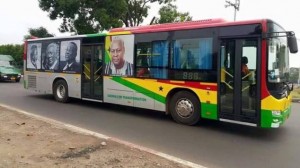We will make ourselves available to citizens seeking to access information – Movement
 Members of the pressure group, Citizen Ghana Movement, say they will make themselves available to any Ghanaian citizen seeking to access public information in the country.
Members of the pressure group, Citizen Ghana Movement, say they will make themselves available to any Ghanaian citizen seeking to access public information in the country.
The group won a landmark legal suit against the Attorney General and the Ministry of Transport in the matter of the re-spraying and rebranding of 116 buses by a company known as Smartty’s. The work which cost the country GH¢3.6 million, approximately $1 million, caused public outrage, but was justified by the President, during a press conference at the Flagstaff House, Accra.
President John Mahama on January 12, 2016 gave the rationale for re-spraying and rebranding of the116 buses.
“The buses came in a dark orange colour, and the justification that was given was to differentiate them from the City Express buses that work outside the urban centres, because these were being brought in as urban buses,” he said.
However, a report by the Attorney General after investigations were ordered by the Chief of Staff, on the matter found that the procurement method used to award the contract to Smartty’s did not among other things, ensure value for money, adding that independent consultations made by the Attorney General with some leading motor firms in the country confirmed that the contract would have been executed at a cheaper cost if other bids were considered and price comparisons made.
Smartyy’s was therefore asked to refund the excess amount paid to it. Smartty’s has reportedly paid up the excess amount, according to some newspaper reports.
Since the matter came up, some citizens have sought to gain access to the Attorney General’s report and documents covering the transaction, but the government has refused to give citizens access leading to the court action by the group.
In its ruling, which has been globally acknowledged as a reiteration of the need for easy access to information as a fundamental right of citizens of all countries, a human rights court in Accra ordered the disclosure of the controversial contract between the Ministry of Transport and Smartyy’s Productions for the rebranding jobs.
The Ministry of Transport and the Attorney General are to make the bus branding contract absolutely available to the seven in 14 days. Other documents relating to the contract are however to be made available subject to prohibition of their disclosure by other laws and the propensity of such disclosures to cause harm.
The court also ordered that the respondents answer in writing, whether or not the award of the contract was done in adherence to the Public Procurement Act 2003 (Act 663), whether or not the contract procurement was competitive or sole sourced, and whether or not there were other alternatives to the contract.
The controversial contract led to the resignation of then Transport Minister, Dzifa Attivor.
Addressing the media, Nana Akwasi Awuah, a member of the legal team for the Movement noted that the court’s decision has reasserted citizen’s right to information, even in the absence of the Right to Information Law.
Ghana’s Right to Information Bill has been on the shelves for over 10 years – yet to be passed into law.
Reiterating what the court said in the ruling that no one should be allowed to benefit from their own inactions, referring to the government’s failure to pass the Right to Information Bill into law.
The group insists, their actions were in pursuit of probity and accountability, and with the experience that have gained from the case, they would make themselves available to citizens who are seeking to access public information and have difficulties.
Mr. Kofi Bentil, a member of the legal team, indicated that, the victory at the high court is an indication that citizens seeking to assert their constitutional rights do not have to necessarily go to the Supreme Court. “Citizens can go to the High Court to get constitutional provisions enforced,” he said.
According to Awuah, once they receive the documents on the transaction, they would examine it, and should they find any breaches of the law, they would decide on the next line of action.
By Emmanuel K. Dogbevi
